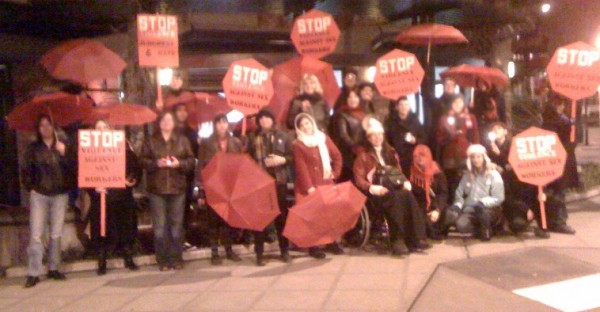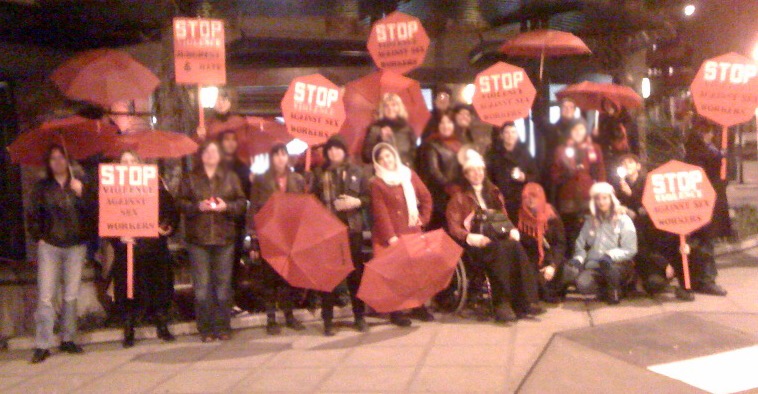
SWOP-Seattle went to Olympia to speak in front of the legislature about the proposed End Demand bill, with the result that Senator Kohl-Welles has a third amendment to add, one which will increase the penalty for buying sex only after the third arrest, a misunderstanding only slightly less appalling than a recent senator’s offer of a hot meal to an activist lobbying against discrimination against sex workers.
Church leaders in Scotland have signed a letter calling for an amendment to the Human Trafficking and Exploitation Bill which would criminalize the purchase of sex in Scotland. Sex workers and rights activists are protesting, pointing to the recent report which concluded that End Demand did anything but protect sex workers.
This National Post review goes over all the work of controversial Canadian French writer and ex-sex worker Nelly Arcan, who hung herself in her apartment in 2009. Her novel Whore—a bleak account of a sex worker’s life as told to her psychoanalyst—was nominated for both the Prix Medicis and the Prix Femina, two of the most respected French literary honors. (As told to her psychoanalyst, though? Could that plot be more French?)
Trans porn performer, cam girl, and writer Rebeka Refuse talks about her entry into sex work, Marxism, her work with Trans Housing Network and her plan to create small, easily fundable shelters for trans people.
Bonela and Sisonke, two sex workers’ rights groups in Botswana, wrote a letter about the recent support for sex workers’ rights shown by Assistant Minister of local Government and Rural Government, Botlogile Tshireletso.
Simon Leahy, who clearly isn’t friends with any sex workers, is having a porn festival in New York to open up a wider dialogue about sex. The festival includes a film by James Franco; sadly, Miley Cyrus’ contribution was withdrawn.
The Virginia Trucking Association is partnering with Truckers Against Trafficking to help educate truckers about what trafficking looks like. Not “how to provide best services to young runaways,” or “how to recognize and respond to abusive behaviors,” but “trafficking.” Okay then.
An Australian man who raped an escort multiple times through fraudulent payments has been sentenced to eight months in jail.
The city of Amsterdam is looking for an investor for five buildings which would then be collectively operated by sex workers; the buildings have room for about 50 sex workers. City officials theorize that this collective model, unlike the window model, will protect the women from pimps.
Carla Avelar helped to organized the first trans women’s rights group in El Salvador, El Nombre de la Rosa, and later organized COMCAVIS, which works for the rights of trans women in the gay and trans unit of the prison Sensuntepeque, and also does HIV intervention work.
Tania Rashid and Soraya Auer don’t know if they want to write a horror expose on trafficking in Daulatdia, a mega-brothel in Bangladesh, or a story about the lives of sex workers: their families, children, strategies for success. They try to do both for maximum impact and end up with a split story whose more mellow end has little relation to the horrors of its beginning. The closure of Tangail brothel in northern Bangladesh is touched upon in passing, but no mention is made of the hundreds of sex workers who mourned for it and returned to it as soon as possible, and apparently none of the many vocal sex worker activists in Southeast Asia work in Daulatdia, as they don’t merit a mention either.
Sex workers in Delhi voted, hoping to raise the issue of legalization for their own protection and their children’s education.
Workers in Fiji are also organizing and lobbying for the recognition of their human and labor rights.
A study is beginning which will test whether access to microloans can reduce Tijuana sex workers’ vulnerability to HIV by giving them more negotiating power and agency.
The Swedish Model does not work: Naomi Sayers will say it until people begin to listen.
Melissa Gira Grant writes about 8 Minutes, the latest, most grotesque result of the American fantasy of rescuing sex workers.
The Economist rolls up its sleeves and makes the case for sex work-as-work, studying it “like any other industry.”
Sex worker activists successfully lobbied for the cancellation of an appearance by Kate Smurthwaite, a prohibitionist feminist proponent of End Demand, at University of London, a move which Ian Dunt at the Guardian [not a sex worker] is calling a “threat to free speech.” Clearly Dunt don’t have to struggle with the results of the prohibitionist policies people like Smurthwaite endorse.
And yet there are concrete consequences to whorephobia and sex worker stigma, including increased violence, lose of custody, other employment, and housing.
A first edition of a seventeenth-century sex manual is up for auction this weekend. For those interested in getting it on Early Modern-style, it offers tips such as
entertain her with all kinds of dalliance, wanton behaviour, and allurements to Venery, but if he perceive her to be slow and more cold, he must cherish, embrace, and tickle her … intermixing more wanton Kisses with wanton Words and Speeches, handling her Secret Parts and Dugs, that she may take fire and be inflamed to Venery.
Mmmm.
Ignacio Marino, the mayor of Rome, wants to create a red light district for sex work.
Dreamcatchers, a documentary about former sex worker Brenda Myers-Powell’s work with current street workers, won the Directing Award for World Cinema Documentary at Sundance this year.
Further evidence of the media’s focus on sex work-as-salacious-clickbait, precluding actual research or reporting: turns out that actually the notion of a symbiotic relationship between workers and techies in Silicon Valley was a bit half-baked: sex workers in Silicon Valley are getting priced out by their clients in the same decades-old pattern of sex workers anywhere getting priced out by gentrification.
Don’t let this headline fool you, an apology “if” you hurt someone isn’t a real apology, especially not several years after the fact. Attn: Dominique Strauss Kahn.
